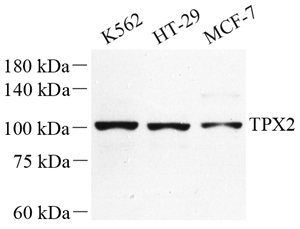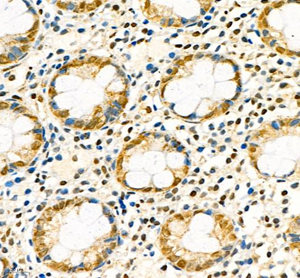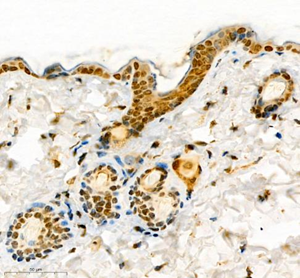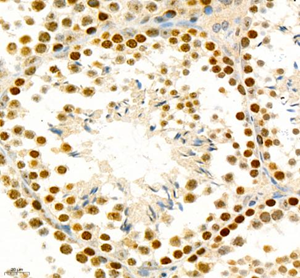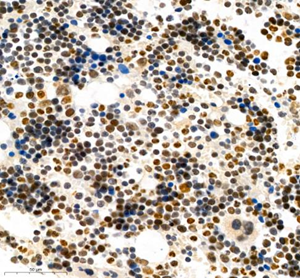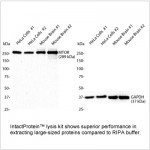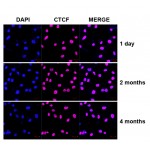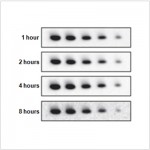| Reactivity: | H & H,M,R |
| Applications: | WB & IHC/IF |
| Host Species: | Rabbit |
| Clonality: | Polyclonal |
| Full Name: | TPX2 rabbit polyclonal antibody |
Gene Name: | Targeting protein for Xklp2 |
Synonyms: | Tpx2, DIL2, C20ORF1, C20orf2 |
Immunogen: | KLH conjugated Synthetic peptide corresponding to Mouse TPX2 |
Isotype: | IgG |
Purity: | Affinity purification |
Subcellular location: | Nucleus, Cytoplasm |
Predicted MW. | 86 kDa |
Observed MW. | 100 kDa |
Product Usage Information
Applications | Species | Dilution | Positive Sample |
WB | Human | 1: 500-1: 1000 | K562, HT-29, MCF-7 |
IHC/IF | Human, Mouse, Rat | 1: 200-1: 400 | bone, colon, skin, testis |
Background
TPX2 is an ortholog of the Targeting Protein for Xenopus kinesin-like protein 2 (XKLP2) and was originally named restricted expression/proliferation-associated protein 100 (REPP86). TPX2 regulates the Xenopus kinesin-like protein 2 which is a plus end-directed microtubule motor required for centrosome separation and maintenance of spindle polarity during mitosis. TPX2 activates mitotic serine-threonine Aurora A kinase, nucleates microtubules and is considered as a critical factor for spindle assembly in mammalian mitotic cells. It is actively transported into the nucleus during interphase via importin alpha/beta receptors and this nuclear import sequesters TPX2 away from cytoplasmic tubulin to prevent premature spindle assembly.
Images
|
|
Western blot analysis of TPX2 (GB111226) at dilution of 1: 500 |
|
|
Immunohistochemistry of paraffin embedded human colon using TPX2 (GB111226) at dilution of 1: 200 (400x lens) |
|
|
Immunohistochemistry of paraffin embedded mouse skin using TPX2 (GB111226) at dilution of 1: 200 (400x lens) |
|
|
Immunohistochemistry of paraffin embedded mouse testis using TPX2 (GB111226) at dilution of 1: 200 (400x lens) |
|
|
Immunohistochemistry of paraffin embedded rat bone using TPX2 (GB111226) at dilution of 1: 200 (400x lens) |
Storage
| Storage | Store at -20°C for one year. Avoid repeated freeze/ thaw cycles. |
| Storage Buffer | PBS with 0.02% sodium azide, 100 μg/ml BSA and 50% glycerol. |

